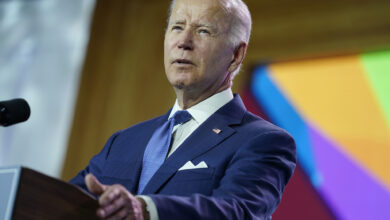Egypt is abuzz these days with discussions over the proposed amendments to the 1971 constitution. The country is divided into two camps, each rallying supporters to vote for or against the amendments in the referendum tentatively scheduled for March 19 by the Supreme Council of the Armed Forces (SCAF). In a poll conducted by the Egyptian Cabinet’s Information and Decision Support Center, 58 percent of over 60,000 participants said they “would not agree to the suggested modifications of the Egyptian Constitution.”
From the beginning, I have set my mind against any amendments to the constitution, seeing the question as a matter of principle: the 1971 constitution had lost its legitimacy with the fall of the Mubarak regime and with the SCAF’s decision to abrogate it, acknowledging the revolution as the only source of legitimacy. Many prominent figures, including reform advocate Mohamed ElBaradei, have stood against any constitutional amendments and have called instead for a declaration of constitutional principles to govern the interim period leading to the drafting of a new constitution.
Despite my objection in principle to amending a defunct and illegitimate constitution, I have decided, for the sake of pursuing an informed discussion with the proponents of the amendments, to put together my objections to the details of the proposed changes.
1. Proponents of the amendments affirm that the proposed amendment to Article 189 bis renders the constitution temporary by obliging the coming president and parliament to call for drafting of a new constitution within six months. However, the amendments leave room for much doubt due to their loose linguistic formulation which puts Article 189 bis subject to Article 189, leaving room for interpretation of whether it actually mandates drafting a new constitution. If we assume, for the sake of argument, that the constitution is to be rendered temporary, what is the purpose of amending Article 77 to change the presidential term from six to four years, renewable once, since this article will not be there after the issuing of the new constitution?
2. The president’s constitutional privileges have not been touched, including her power to unconditionally dissolve the parliament. If the answer to this objection is that it is a temporary constitution, then why is there a proposal to amend Article 77 and not other articles that are equally controversial?
3. The system of government is not even remotely defined between parliamentary and presidential systems. If it is a presidential system, there is no role for a prime minister who is appointed by the president, de facto rendering the latter unaccountable; if it is a parliamentary system, the constitution should clearly state that the parliamentary majority forms the government. The amendments retain the current deformed system of government that does not guarantee any real separation of powers.
4. The parliamentary term is still five years, while the presidential term is now four. This disparity leads to one election affecting the other unsystematically. Presidential and parliamentary elections should be held at equal intervals.
5. The amendment to Article 75 regulating the eligibility of candidates for presidential elections states that the candidate, or any of her parents, must not have ever held any other nationality and that she be not married to a non-Egyptian. The first part runs against the principle of non-retroactivity and holds the candidate responsible for her parents’ choices. The second part takes away from the political rights of candidates based on their choice in marriage, which violates a basic human right.
6. Two objections to the proposed amendments to Article 76 regarding the elections of the president of the republic: First, it states that the decisions of the presidential election committee (formed of judges) are final, self-validated and cannot be appealed before any judicial authority, rendering a certain entity a judge and a potential litigant, in a clear violation of procedural law; second, the amendment deletes the stipulation that a president-elect be announced when she obtains a simple majority, which requires a second round of elections between the two candidates with the highest votes if no candidate obtains the simple majority in the first round. The proposed amendment allows for a candidate to win by simply obtaining a plurality of votes.
7. The proposed amendment to Article 139 obliges the president to appoint a vice-president, whose role is to be questioned. If Egypt is to be governed by a presidential system of government, then the vice-president has to be elected with the president.
8. The proposed amendments to Article 189 and 189 bis put the council of ministers – appointed by the president – in charge of approving the president’s demand to amend the constitution, which puts an entity appointed by the president as the adjudicator of her decision, adding to the confusion regarding the authority of the president.
Now, the burden is on the opponents of the amendments to propose an alternative route. Many have proposed alternatives, among which I propose three immediate steps for the interim period:
1. A brief declaration of constitutional principles to affirm basic rights, govern the interim period and outline its stages.
2. An interim presidential council of three to five civilians, elected through an open-list system, who cannot run for the coming presidential or parliamentary elections.
3. A constitutional convention, elected through a proportional or semi-proportional system, to draft a constitution to be put to a referendum.
The proposed timetable is one year, allowing for the election of a presidential council, a constitutional convention, and the drafting and voting on a new constitution. This period is also meant to provide a healthy atmosphere for the formation of new political parties and for the democratic practice of political rights.
Needless to say, what we now need is open discussions and deliberations to produce the best alternatives we can have, instead of quickly surrendering to trade-offs. The spirit of the revolution implies believing in our collective efficacy, rather than fearing the unknown and resorting to half solutions.
Soha Bayoumi is a PhD candidate at the Institut d'Etudes Politiques de Paris (SciencesPo) and visiting fellow and teaching assistant at Harvard University, Faculty of Arts and Sciences.




